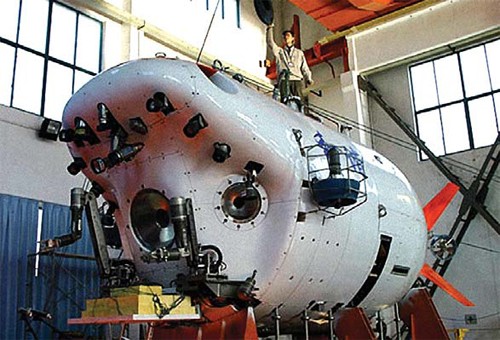gCaptain -
China plans an ultradeep dive by a manned submersible beneath the Pacific that would propel it past the U.S. in a race to explore potentially vast mineral resources in the deepest parts of the world’s oceans.
The Jiaolong—named after a mythical sea-dragon—left China on board an oceanographic research ship on July 1. It arrived on Saturday at its destination in the northeastern Pacific, between Hawaii and North America, where it is to attempt a dive to 5,000 meters, or about 16,400 feet, according to state media reports.
The state-run Xinhua news agency on Saturday quoted Liu Feng, the director of the diving trials, as saying the sea was too rough to attempt the first of its planned four dives before Wednesday. “We’ll use this time to do our preparatory work down to the last detail, and as soon as sea conditions improve, we’ll start sea trials,” he was quoted as saying.
Xinhua quoted Liu Cigui, director of the State Oceanic Administration, on Saturday that a “marvel” of Chinese manned submergence would occur in the next 15 days. The administration, which is overseeing the mission, didn’t respond to a request to comment.
The planned dive would be the latest milestone for China in a high-stakes technological race once dominated by the U.S., which in 1960 sent two men to the bottom of the Mariana Trench—at 11,033 meters the deepest point in the world’s oceans—in the now-retired Trieste bathyscaphe.
The U.S. led undersea exploration and mining efforts for several decades thereafter, but commercial interest waned in the 1980s and 1990s because international prices for nickel, copper and other commodities thought to be most easily mined from the deep seabed at the time were insufficiently high.
The U.S. Navy used to operate three manned submersibles, including one, called the Sea Cliff, that was capable of going down to 6,000 meters, but didn’t replace it after its retirement because of defense cutbacks in 1998.
Now, many experts say the U.S. risks falling behind potential commercial and military competitors as rising commodity prices make undersea mining more profitable, and China and Russia apply for rights to explore newly discovered deep-sea deposits thought to hold larger quantities of silver, gold, copper, zinc and lead in particular.
The race has commercial, scientific and military implications comparable to space exploration, in which China is also now a world power as one of only four countries—alongside the U.S., Russia and India—capable of manned space flight.
Although Chinese officials say the Jiaolong is for civilian purposes only, foreign military experts say such a craft could be used to intercept or sever undersea communications cables, to retrieve foreign weaponry on the ocean floor, or to repair or rescue naval submarines.

Posted via http://batavia08.posterous.com batavia08's posterous
.jpg)
No comments:
Post a Comment